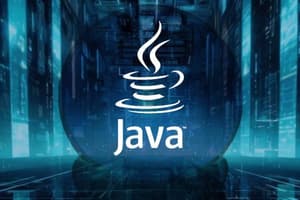Podcast
Questions and Answers
Explain the difference between Java and C++ in the context of object-oriented programming language.
Explain the difference between Java and C++ in the context of object-oriented programming language.
Java is a purely object-oriented programming language, whereas C++ is a hybrid language that supports both procedural and object-oriented programming.
What are the different types of variables in Java?
What are the different types of variables in Java?
The different types of variables in Java include local variables, instance variables, and class variables (static variables).
Define and explain the usage of constructors in Java.
Define and explain the usage of constructors in Java.
Constructors in Java are special methods used for initializing objects. They have the same name as the class and do not have a return type. Constructors are called when an object of a class is created.
What is the purpose of the 'finalize' method in Java, and how does it relate to garbage collection?
What is the purpose of the 'finalize' method in Java, and how does it relate to garbage collection?
What are static variables and methods in Java, and how are they different from instance variables and methods?
What are static variables and methods in Java, and how are they different from instance variables and methods?
Explain the concept of method overloading in Java.
Explain the concept of method overloading in Java.
What is dynamic method dispatch in Java?
What is dynamic method dispatch in Java?
How is the 'static' keyword used before variables and methods in Java?
How is the 'static' keyword used before variables and methods in Java?
Flashcards are hidden until you start studying
Study Notes
Java vs C++ in Object-Oriented Programming
- Java and C++ are both object-oriented programming languages, but Java is more focused on platform independence, simplicity, and ease of use, while C++ is more focused on performance, control, and flexibility.
Types of Variables in Java
- Primitive variables: store single values (e.g., int, boolean, char)
- Reference variables: store references to objects (e.g., String, arrays)
- Array variables: store collections of values or objects
Constructors in Java
- A constructor is a special method that initializes an object when it's created
- Constructors have the same name as the class and no return type (not even void)
- They are used to set initial state of an object and ensure it's in a valid state
- Constructors can be overloaded, just like methods
Finalize Method and Garbage Collection
- The finalize method is a special method that is called by the garbage collector before an object is destroyed
- It's used to release resources, such as file handles or sockets, that the object has acquired
- The finalize method is called only once, just before the object is garbage collected
Static Variables and Methods
- Static variables belong to the class, rather than instances of the class
- Static methods belong to the class, rather than instances of the class
- Static members are shared by all instances of the class
- Static methods can only access static members
Method Overloading
- Method overloading is when multiple methods have the same name but different parameter lists
- The method that gets called is determined by the number and types of arguments passed
- Method overloading allows for more flexibility and readability in code
Dynamic Method Dispatch
- Dynamic method dispatch is when the method to be called is determined at runtime, rather than compile time
- It's used to implement polymorphism, where objects of different classes can respond to the same method call
- Dynamic method dispatch is achieved through method overriding and method overloading
Static Keyword
- The static keyword is used to declare static variables and methods
- Static variables are shared by all instances of a class
- Static methods can be called without creating an instance of the class
- Static members are initialized only once, when the class is loaded
Studying That Suits You
Use AI to generate personalized quizzes and flashcards to suit your learning preferences.




